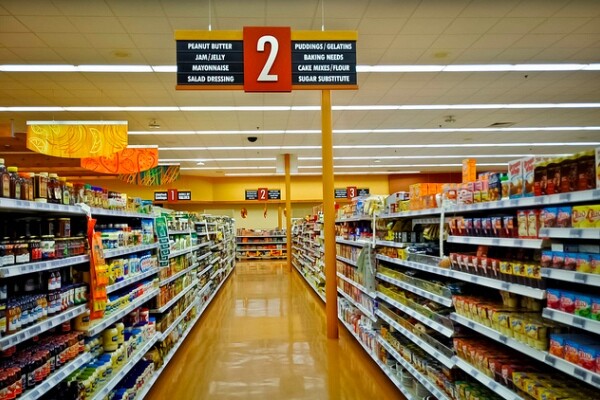Why Do We Waste So Much Food?

Take a look at the above photo. Now, imagine a giant garbage can in the back there. And now, mentally lift one-third of the perfectly edible food from the shelves and dump it all in. That's basically what America's doing to its food.
Those are the findings from the huge new study put out last week by the U.S. Department of Agriculture. To illustrate their point further, they gave us some extra fun ways to count how much food we waste: 141 trillion calories a year go in the trash! Or, 1,249 calories per person per day! Or, $161.6 billion in food production essentially produces nothing!
No matter how you count it, the waste is simply staggering.
It's clearly a problem that needs to be addressed, but not necessarily for reasons you think. You know how your mom made you finish your plate because, "kids in Africa are starving"? The heart's in the right place with that sentiment, but it's not as if it's possible to scrape the last few veggies off your plate and ship them across the Atlantic. Instead, among the ways food waste comes back to hurt us is through the opportunity cost of wasting so much land:
If we planted trees on land currently used to grow unnecessary surplus and wasted food, this would offset a theoretical maximum of 100% of greenhouse gas emissions from fossil fuel combustion.
Also, and more obviously, all that waste is a terrible use of water. Half the water used to grow crops ends up producing food that gets thrown out. Just imagine what how handy all that water would be right about now.
Food waste is certainly an important issue. But the question remains: Why do we waste so much food?
We're Buying in Bulk
I'm not talking about Costco or the various other big bulk stores where you can bring home jars of mayonnaise the size of a toddler -- although, they certainly aren't helping the cause -- but instead, it's mostly your regular grocery store shopping environment that's to blame. Rather than buying an amount of food that corresponds to the amount of customers coming through, stores are so terrified of running out of an item they overbuy on purpose. And when they're overstocked they start offering sales:
People go into the shopping environment, they see opportunities to buy two for the price of one, half price offers or radically reduced offers and they take too much stuff away and they actually never get around to using it.
While it may seem like a bargain when you're filling your cart, odds are a lot of it's just going to end up in the trash. The solution: Stop falling for the deal unless you're absolutely positive you're going to eat it. If enough of us do this, the store will get the message to order less the next time. Of course, the odds of this actually happening -- of enough shoppers passing up great deals by focusing on longer term goals -- are obviously very slim.
We're Scared of a Little Decomposition
This one's barely our fault. As human beings, we're hard-wired to be disgusted by spoilage as a means to protect us from being poisoned. But that natural defense mechanism manifests itself in wasteful ways. For example, instead of cutting away the rotten portion of a banana, most of us just chuck the entire thing into the trash. This is not what our body had in mind when it made our nose.
This obsession with eating only perfect food also works its way into how we shop:
We expect our fresh foods to be both beautiful and uniform, or at least supermarkets think we do. Anything not cosmetically flawless nor the right shape and size is cast aside at some point in the food chain. This increased emphasis on our food's appearance stems largely from the ever-increasing popularity of food TV and the abundance of glossy cooking magazines. Yet, food isn't always "glossy."
Know how you felt the apples at the store until you found the perfect one? Well, so did everyone else. And those that didn't pass the test, the ones that were just a tad bit off -- but mind you, still perfectly edible -- end up sitting there long enough to rot and eventually get thrown out. So, next time you're at the store, try picking one that's not perfect, leaving those specimens for the shallower among us.
Never Truly Needing
This one's more of an all-encompassing idea, but it's also likely the biggest reason for all this waste.
Most Americans have never really worried about having something to eat. Food's just a thing that's there. It's not a question as to whether or not we're going to eat that night, but instead a question of what we're going to have. Sure, maybe we don't have enough money to afford the fanciest restaurants, but most of us can find enough pocket change for a few tacos from the truck. As such, many of us don't really respect the process of food production because, frankly, we don't have to. We're not worried about going hungry, so why worry about a little waste?
This problem really isn't one with a solution, other than trying to be more mindful. You don't have to trade in your belongings, live on the street, and start dumpster diving. But, if you did, there's unfortunately way too much in the trash for you to live off of.